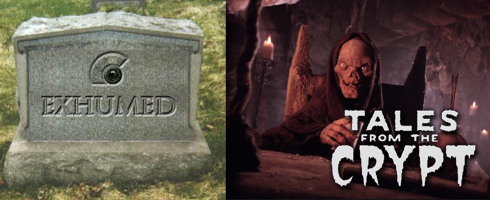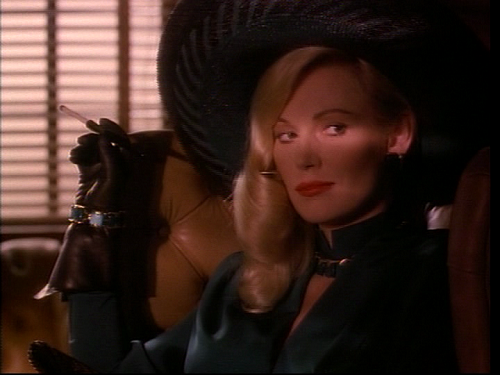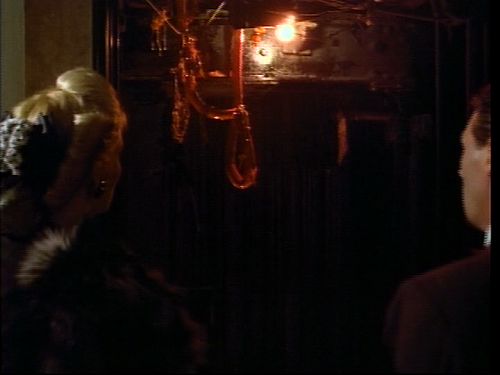
Seance (4.4)
“Monkey Island is where the loser cons go at the end, dead-eyed and desperate, Benny. There ain’t no life on Monkey Island.”
WHAT IS IT?
A Con Man and a Con Woman (or are they just called Con People now?) try to bilk a millionaire out of $300,000. When that fails, they try his widow.
WHO’S RESPONSIBLE?
The big star here, for probably the first time in her career, is Cathy Moriarty (probably best known for her debut role as Vicki La Motta in Raging Bull). She’s supported by performances from Ben Cross (Star Trek, Chariots of Fire), John Vernon (Animal House, Killer Klowns From Outer Space) and Ellen Crawford (ER). Magician and former Night Court cast member Harry Anderson wrote it and Gary Fleder, director of such middling thrillers as Don’t Say A Word and Kiss The Girls, directed it.

HOW IS IT?
It’s pretty good, which isn’t really surprising. Even without big name talent behind it, the genre of film noir is so distinct and ubiquitous that it’s very easy to imitate. There’s a reason that, for a good five years in the 90’s, every TGIF sitcom had a “noir” themed episode, usually in the form of a character’s dream or fiction-writing homework. The only really shocking thing about this episode is that it took a pulp-obsessed show like Crypt until their fourth season to do it. In fact, that’s probably the episode’s greatest weakness as well: noir fits so snuggly into Crypt’s wheelhouse that, without a lot more going for it, it hardly feels like a special “genre exercise” episode at all. We’ve tasted the pulpy Dashell Hammett flavor of noir for three seasons. Now that it’s the main course, it’s all too familiar.
Which isn’t to say it’s without it’s charm. The bulk of the episode falls on the shoulders of the unlikely conman team of Alison Peters (Cathy Moriarty) and Benjamin A. Polosky (Ben Cross). Moriarty’s impeccable beauty and rough edges make her an ideal femme fatale, and she plays the role with great ease. It also doesn’t hurt that the movie she’s most associated with, Raging Bull, was a black and white movie that took place in the 1940’s. As opposed to other Crypt actresses who have played similar roles, like Demi Moore in Dead Right, her lack of “modern” baggage makes the character of Alison feel more authentic and less like a winking imitation. Alison’s partner Benjamin Polosky, on the other hand, couldn’t be more ill-suited for his line of work. He possesses the worst thing a con-man can have: a conscious. He whines and worries so much about silly things like morality that you have to wonder why they’re a team at all. And this dynamic can be very entertaining (Diane Keaton and Woody Allen share a similar relationship in Love and Death) but here he’s just mostly annoying.
Their plan is to con wealthy industrialist Prescott Chalmers (John Vernon) out of $300,000 with a combination of Ben playing a lawyer with a fake inheritance scheme, Alison playing Chalmers’ long lost cousin, and blackmail photos (as a plan B). Or, as the Ocean’s 11 crew might call it, a Yeti Fight, two Ghost Camps, and a Skip-The-Sandwich. The plot, like so many in these kinds of stories, is too convoluted, trivial, and tedious to explain in detail, so let’s just skip to the part where Alison agrees to meet Chalmers in a hotel room. She goes through all the trouble of putting on a sexy dress and a saxy record, but in all honesty she probably didn’t have to. Cousin or not, Chalmers was ready to jump her bones the minute he saw her. Anyway, they get down to their business while Ben, hiding in the closet, gets down to the business of taking blackmail photos.
The next day, they all meet in Ben’s office, with Chalmers prepared to pay Ben for his share of the inheritance (don’t worry, like I said, the details aren’t worth going into) with a suitcase full of $300,000. He almost goes through with it too, until Ben starts humming the saxophone melody from the sexy record Alison put on the night before. Knowing he’s been played, Chalmers leaves in a huff. Not even the threat of the blackmail pictures slows him down because, he says confidently, “My wife will never see them”. Accidentally falling down an open elevator shaft, on the other hand, slows him down pretty damn good. And when a descending elevator crushes him (nicely squishing his guts and intestines all over the bottom of the car), that pretty much seals the deal for Chalmers, as well as Ben and Alison’s shot at his money. That is, until after giving a statement at the police station when they run into his wife, Dorothy Chalmers. Dorothy is both trusting and literally blind (which, of course, is why he wasn’t worried about the blackmail photos) and assures Alison (who she still thinks is Chalmers cousin) that she’ll fulfill her husband’s wishes when it comes to his will.

The way she’ll know what those wishes are, however, is by talking to him through her medium. Seeing an easy mark, Alison formulates a new plan: she’ll impersonate Dorothy’s “spiritual advisor” (tying the real one up), and when they perform the seance Ben will appear, dressed in dark shrouds, and tell Dorothy to give Alison all of the money. Ben whines about how wrong it all is, naturally, but he goes ahead with it anyway, hiding in the closet until his entrance. Dorothy arrives and they begin the seance, and Ben’s ghostly figure comes out right on cue. But it turns out not to be Ben, but Mr. Chalmer’s ghost himself, holding Ben’s decapitated head in a box. The ghost then goes on to brutally pierce her chest with his hand, ripping out her beating heart, ending the episode on another impressively gory scene.
But sadly it’s not enough to save it. Remember when I assured you that the scam was complicated and unimportant? That was true, but the episode makes the poor decision of dedicating most of it’s time to it. The scenes of Alison and Ben discussing the plan, laying out the plan, conning Chalmers etc. are all very dull and take up nearly two thirds of the episode. I feel that the episode could have began in media res, with Chalmers realizing he’s being conned in the opening scene, without losing anything and have a lot more time for the more interesting aspect of the two conning a blind woman. As is, even two really outstanding bits of gore (which, at this point in the series, have become expected) can’t elevate it to that higher plane.

DOES IT HATE WOMEN?
Alison may be evil, but she’s a femme fatale, so that’s to be expected. Also, she’s clearly the smartest and most talented person in the episode: Ben’s not only a whiny baby, he’s also the one that blows their cover. And the other woman in the story is the sweetest most kind-hearted person possible. Hell, Alison’s body isn’t even shot in an objectifying way. This episode’s fine.
ALSO WORTH NOTING:
*Seance has that grimy 90’s neo-noir aesthetic in spades. Then again, a lot of the things I associate with neo-noir (from the soft focus, smokey rooms and jazz saxophones of films like Palmetto and Body Heat) are really just byproducts of being a mid-budget HBO show in the 90’s.
*It’s entirely possible that Ben’s character constantly hiding in closets was just a coincidence and not subtle in-joke. But I doubt it.
*The noir-voice that the Cryptkeeper puts on during the framing segments (in which he plays a private detective) is really weird, and made me kind of uneasy. But that’s probably just on my end.
WORST CRYPTKEEPER JOKE:
“Something in her sockets said ‘Beware’. Must have been the way they said ‘hollow’ to me.”
GRADE: B-
JOHN SAYS:
It’s rare that there’s a good showcase for Cathy Moriarty, but that’s the case here. Her striking height and evil witch rasp makes her a natural fit for a femme fatale, and John Vernon is also used pretty effectively as a savvier-than-expected mark. This is an agreeable enough yarn, but yeah, it never really gets out of its own way enough to rise above the modest level of its ambitions. The elevator sequence is really nice, though, and maybe I’m just feeling charitable to noir because of that game I’m playing right now, so it gets a passing grade. Three stars, meritorious.